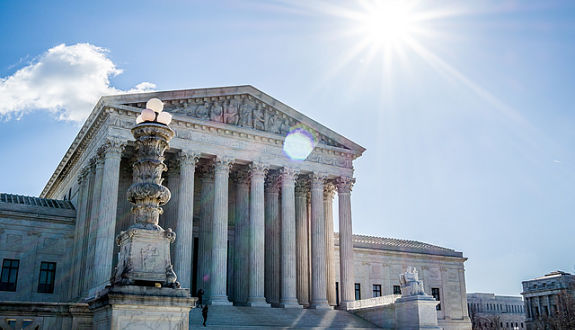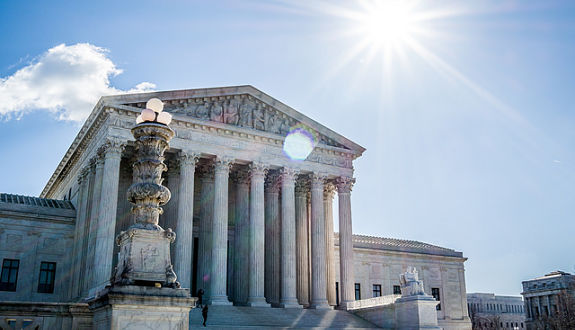Supreme Court Round Up!
- by
- Jun 26, 2018
- Legal News, News, Supreme Court Rulings
- Reviewed by: Matt Riley


The Supreme Court has been on quite a tear lately, rifling off several important decision. This post is going to summarize some of the major cases. At the very least, getting a lay of the legal landscape will allow law school-bound students to sound somewhat informed heading into the semester.
1. Masterpiece Cakeshop v. Colorado
The facts of this cake are relatively straightforward: a couple asked a Christian baker to create a cake for their same-sex wedding and the baker declined as a result of his religious beliefs. Following a complaint, the Colorado Civil Rights Commission ruled against the baker. Throughout the state court proceedings that followed, the case was mostly argued on First Amendment grounds. However, in its recent opinion, the Supreme Court sidestepped the issue and focused solely on the proceedings before the Colorado Civil Rights Commission, holding that religious animus infected the proceedings — a fancy way of saying the Civil Rights Commission expressed some hostility towards the baker’s religious beliefs — and the decision should be overturned. You’ll hear the word “punt” a lot when discussing Masterpiece Cakeshop, because the Supreme Court didn’t make any decisions about the baker’s First Amendment rights.
2. Carpenter v. United States
Carpenter is probably the case I find most interesting from this recent set of opinions. The issue here involved whether warrantless collection of cell phone location records violates the Fourth Amendment (which prohibits unreasonable searches and seizures). Longstanding Court precedent on the Fourth Amendment holds that information voluntarily turned over to a third party is not protected (the “third party doctrine”). Recently, however, this doctrine has come into question insofar as it pertains to modern technology. The Court determined that cell phone location records are not voluntarily shared, in the traditional sense, and that the third party doctrine does not apply to them (although it did not reject the third party doctrine as a whole). Thus, a warrant is required. The policy basis for this decision was that warrantless access to location records would essentially allow the government to perform longterm surveillance without demonstrating probable cause.
3. Wayfair v. South Dakota
Wayfair provided an avenue for the Court to review its decision in Quill Corp. v. North Dakota, wherein it held that states could not collect taxes on purchases their residents made from out-of-state vendors. The decision in Quill was based on the Dormant Commerce Clause (the negative implication from the Commerce Clause, which prohibits discrimination against interstate commerce), and it essentially allowed e-commerce to run tax free. The Court overturned Quill and the so-called “physical presence rule,” which required some actual, physical presence in the state in order for the state to tax purchases. The decision in Wayfair relied heavily on the fact that online vendors are a major part of the modern economy — which was not the case when Quill was decided — and should not be exempt from taxation. This probably isn’t great news for those of us who buy a lot of goods online, since taxes are now likely going to be factored into the purchase price.
4. Gill v. Whitford/Abbot v. Perez
I’m not going to get too far into the weeds on either of these decisions; rather, I’ll just focus on the main takeaways. Both involve gerrymandering — the practice of redrawing voting districts. The Court has generally been very reticent to get involved in adjudicating disputes related to this practice, but it has held that racially-discriminatory gerrymandering is impermissible and left the door open for finding extreme partisan gerrymandering unconstitutional. Gill involved a challenge to partisan gerrymandering. The Court punted on the issue, finding that there was a lack of standing. Basically, they said the party bringing the case hadn’t shown he’d been harmed by the redistricting at issue so he was not a proper party to challenge it.
Abbot involved a challenge to racial gerrymandering. The state court had determined the redistricting was unconstitutional. The Supreme Court, however, overturned this finding as to three of the four districts (over a scathing dissent by the more liberal members of the Court). The key issue was whether the plaintiffs had demonstrated racially discriminatory intent on the part of the defendants, which the Court largely found they had not. This decision is a blow to those seeking more sweeping protection of voting rights.
5. Bonus Round: Trump’s Travel Ban
This decision just came out today, so I’m not going to talk too much about it. But the key point is that the Court upheld the travel ban on several majority-Muslim countries, finding that the ban says nothing about religious animus and falls within executive power.
So that’s the roundup from the Court’s flurry of activity. Now you can impress all incoming students with your cursory knowledge of recent Court precedent!
Search the Blog

Free LSAT Practice Account
Sign up for a free Blueprint LSAT account and get access to a free trial of the Self-Paced Course and a free practice LSAT with a detailed score report, mind-blowing analytics, and explanatory videos.
Learn More
Popular Posts
-
logic games Game Over: LSAC Says Farewell to Logic Games
-
General LSAT Advice How to Get a 180 on the LSAT
-
Entertainment Revisiting Elle's LSAT Journey from Legally Blonde








